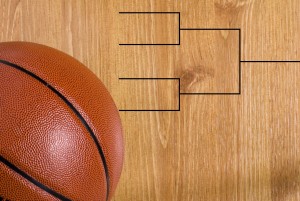
If you’re like most red-blooded Americans, you filled out a bracket for the NCAA tournament. Maybe you just like to fill a bracket out for fun, but odds are you’re in a pool with friends or co-workers that has a little bit of money on the line.
Now, the feds aren’t going to be kicking in your door for running a $5 March Madness pool, but you may want to be a little careful about how you advertise your pool because it’s technically illegal. Anyone who has read this article will understand the lengths the authorities will go to stop illegal gambling taking place. Legal gambling like the use of a Judi Bola website (you may know it as a Gambling Ball) would be preferential given the legal crackdown we have seen in recent times. Gamblers in this country are lucky that this kind of site is legal here as not every nation affords their citizens the same rights to enjoy online casinos and betting sites freely. Take gambling in japan, for example: such sites and casinos in general are totally outlawed, although they are allowed to access and use the sites of other countries – so at least they have a way to get into this form of entertainment if they want to.
March Madness Gambling
According to the Professional and Amateur Sports Protection Act of 1992, otherwise known as the Bradley Act, it is unlawful for a person to gamble “on one or more competitive games in which amateur or professional athletes participate, or are intended to participate, or on one or more performances of such athletes in such games.”
That said, four states are exempt from the Bradley Act, but Minnesota isn’t one of them. The four states exempt from the Bradley Act are:
- Nevada
- Delaware
- Oregon
- Montana
Additionally, if you run your pool through ESPN.com, CBS.com or another online site, you also have to worry about the Unlawful Internet Gaming Enforcement Act of 2006. That act prohibits accepting payments related to gambling, like those found on bonusetu.com (though these are often legal).
“There are easy arguments that could be made that outside of Nevada, a bracket of any sort is illegal, especially if you’re moving it online,” says Alexander Ripps, a legal analyst at Gambling Compliance in Washington, D.C.
The act isn’t completely straightforward though, as it has an exception for fantasy sports (think DraftKings.com or Fanduel.com), and March Madness lands in the murky middle between sporting event and fantasy sport (like fantasy baseball).
Additionally, since the vast majority of pools pay out all the money they collect, authorities aren’t going to be quick to break down your bracket since no third-party is profiting from the pool. That’s why you don’t see many sites taking a cut for a bracket pool. Instead, they offer a free bracket management service, which boosts their ad revenue through extra clicks and pageviews, and they assume there’s no money being exchanged, even though millions of dollars flow through Paypal every March.
In all, the biggest thing you have to worry about if you’re running or participating in a work pool is that you’re violating a company policy. Some larger companies have very strict rules about inter-office gambling, and running a pool could cost you your job. If you’re wondering if it’s against company policy, ask a superior before blindly throwing together a March Madness pool.
Related source: Free Enterprise, Bloomberg Business





